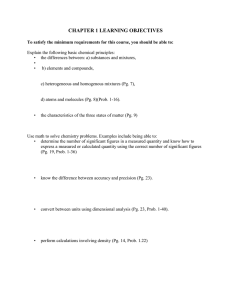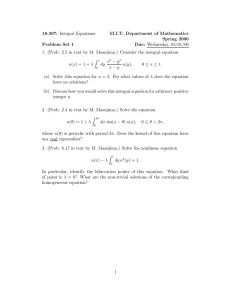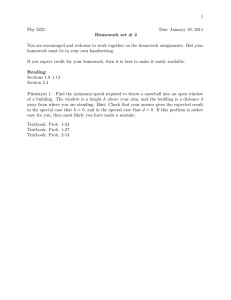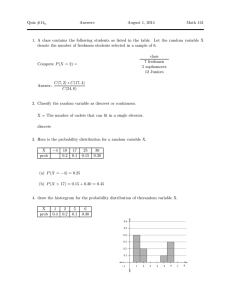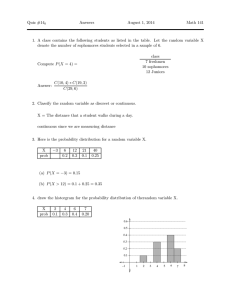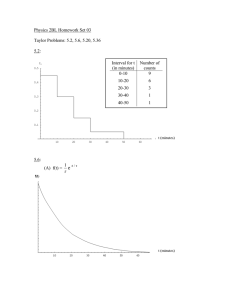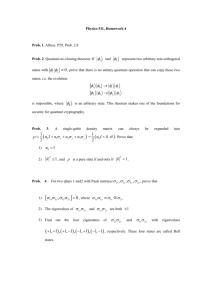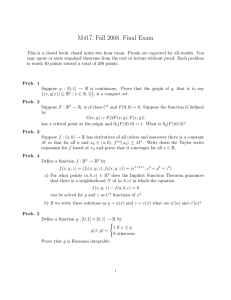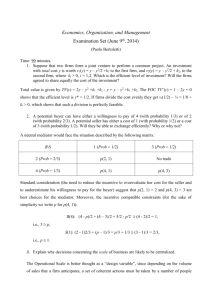Lectures 16 Incomplete Information Static Case 14.12 Game Theory
advertisement
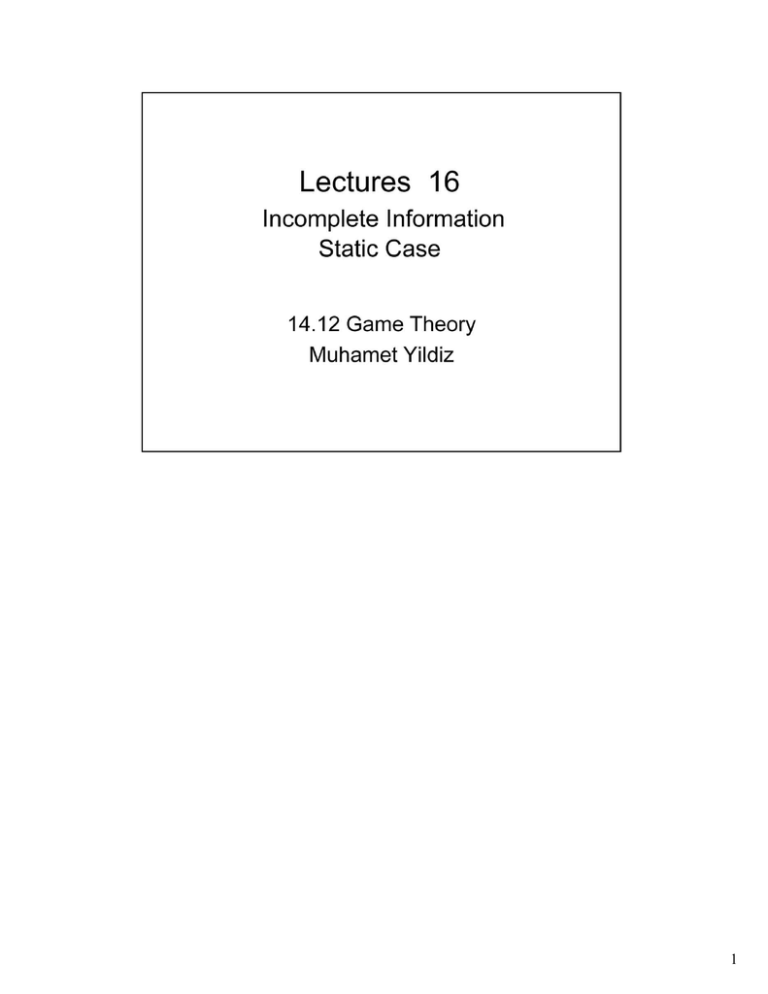
Lectures 16
Incomplete Information
Static Case
14.12 Game Theory
Muhamet Yildiz
1
Road Map
1.
2.
3.
4.
5.
Example
Bayesian Games
Bayesian Nash Equilibrium
More Examples
Bayes' Rule
2
Incomplete information
one player knows something (relevant)
that some other player does not know.
3
Example
Work
(2 , 2)
W
Firm
Hir
Highp
Do not
hire
Nature
Low 1-
Hire
Do not
hire
~ (0, 1)
(0, 0)
W
War
(1 , 1)
~ (-1 , 2)
(0, 0)
4
Bayesian Game (Normal Form)
A Bayesian game is a list
G = {A 1 ,··· ,An; T1 ,···, Tn;P1,··· 'Pn;U 1'··· 'Un}
where
• A; is the action space of i (a; in A;)
• T; is the type space of i (t; in T;)
• p;(t;lt;) is fs belief about the other players
• u;(a 1, ... ,an;t1, ... ,tn) is i's payoff.
5
An Example
Wor
(1 , 2)
W
Finn
~ (0, 1)
Highp
Do no! (0,0)
hire
Nattrre
W Wor
Low
-
Hire
~
(I, 1)
TFirm={tf};
Tw ={High,Low}
A Firm = {Hire , Don't}
Aw = {Work,Shirk}
PF(High) =P
PF(Low) = 1-p
ffv{tr)? /
(-1,2)
Dono!
hire
(0, 0)
6
Bayesian Nash equilibrium
A Bayesian Nash equilibrium is a Nash equilibrium of a
Bayesian game (when each type has positive prob).
• Bayesian game
G = {A 1,···,An;T1'···' Tn;P1, ... ,pn;u1,... ,un}
• a strategy of i is any function s;: T; ---j- Ai;
• A strategy profile s* = (S1 ', ... , S1 ') is a Bayesian
Nash equilibrium ~ s;' (t;) is a best response to s_;'
for each t; i.e.,
max .~>JS: (tl ), ... ,S;·_ I (tH),Q;,S;+I(t;+1), ... ,s:(t,,};t )p;(t_; I tJ
OiEA;
t _iE T_i
7
An Example
Wor
(1 , 2)
W
Finn
~ (0, 1)
Highp
Do no! (0,0)
hire
Nattrre
W Wor
Low
-
Hire
~
(I, 1)
(-1 ,2)
TFirm={tf};
Tw ={High, Low}
AFirm = {Hire, Don't}
Aw ={Work, Shirk}
PF(High) = P >112
PF(Low) =1-p
SF* = Hire
sw* (High) = Work
Sw * (Low) = Shirk
Dono!
hire
(0, 0)
Another
equilibrium?
8
Another example
L
R
x
8,y
1,2
Y
-1,y
8,0
• 8 E {0 ,2}, known by Player 1
• Y E {1,3}, known by Player 1
• All values are equally likely
• T[ = {0,2}; T2 = {1,3}
• Bayesian Nash Equilibrium:
• s[(O)=
• s[(2)=
• S2(1) =
• si3) =
9
Bayes'Rule
Prob(A and B)
• Prob(AIB)
=
Prob(B)
• Prob(AIB)Prob(B) = Prob(A and B) = Prob(BIA)Prob(A)
Prob(BIA)Prob(A)
• Prob(AIB)
Prob(B)
10
Example
p
Work
Success
• Pr(WorkISuccess)
=
J.l
1-p
1-p
Party
I- J.l
• Pr(WorkIFailure)
=
Failure
p
11
0.9
P(WIS)
0.8
0.7
u:- 0.6
5:
iL
--' 0.5
P(WIF)
(fJ
~
iL 0.4
0.3
0.2
0.1
0
0
0.2
0.6
0.4
0.8
~
12
MIT OpenCourseWare
http://ocw.mit.edu
14.12 Economic Applications of Game Theory
Fall 2012
For information about citing these materials or our Terms of Use, visit: http://ocw.mit.edu/terms.
